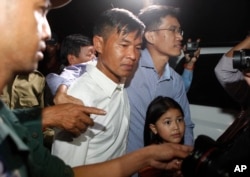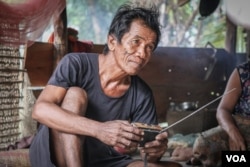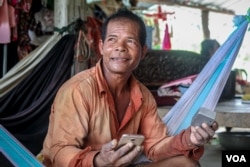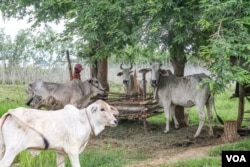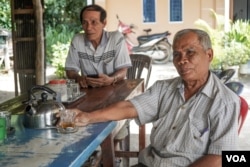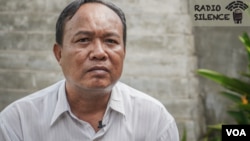
RADIO SILENCE : PART THREE
STORY BY SUN NARIN & KHAN SOKUMMONO
EDIT BY ANANTH BALIGA
Editor's Note: In the last story of this series, VOA Khmer reporters speak to the journalists affected by the government’s 2017 media crackdown. As readers and listeners mourn the lack of independent news coverage, reporters on the frontlines have had to bear the brunt of the government’s anger towards independent journalists.
Reporters and editors said that while there are fewer and fewer independent publications and news outlets in Cambodia to work at – forcing many to leave the profession – those who remain in journalism are committed to reporting the news independently and accurately for Cambodian citizens.
SIEM REAP PROVINCE, Cambodia — Hang Sobratsavyouth is no stranger to conflict. The veteran journalist’s reportage has confronted the government on a number of uncomfortable issues.
Based in the northern province of Siem Reap, Savyouth used to work for Radio Free Asia’s Cambodia Bureau. Listeners often remarked about Savyouth’s booming voice as he delivered researched news reports from the temple town and adjoining provinces.
But his news reports came to an abrupt halt in 2017. Following the closure of radio stations and the government’s use of tax bills to pressure independent news services, Radio Free Asia (RFA) closed its local bureau in September 2017.
“I still miss work. I can’t forget it,” Savyouth said. “Though I lost my job, I still love the profession.”
The RFA closure accompanied similar tax bills handed to The Cambodia Daily and Phnom Penh Post, both independent newspapers with a reputation for their investigative reporting.
While the Daily decided to shut down its operations, the Phnom Penh Post was sold to a Malaysian businessman with ties to the Cambodian prime minister. This lead to a staff exodus over editorial interference from the new owner.
“Her father came to meet me and knelled down to say thank you. Reporting helps victims seeking justice.”
Voice of America and Voice of Democracy were also affected by the shutting down of local and affiliate radio stations, immediately stopping radio broadcasts to large numbers of rural Cambodians.
The media crackdown dealt a severe blow to independent news organizations in Cambodia. However, the worst effects were felt by the journalists who worked for these publications and broadcasters and their sources.
Savyouth points out that on many occasions news reports helped locals get some semblance of justice from Cambodia’s notoriously corrupt local administration and judiciary.
He recalls how a Siem Reap woman was wrongfully arrested on drug trafficking charges. An investigative report from RFA showed the woman to be innocent, leading to her eventual release from prison.
“Her father came to meet me and knelled down to say thank you,” he said. “Reporting helps victims seeking justice.”
But Savyouth is now deprived the thrill of investigating a lead or reporting a story that could undo an injustice. Savyouth said he has been silenced.
Fear, intimidation and arrests
As independent publications and radio broadcasters shut down or scaled back their operations, it was the arrest of two former RFA reporters that sent a warning to the country’s journalists.
Days before the dissolution of the Cambodia National Rescue Party in November 2017, Phnom Penh authorities arrested Uon Chhin and Yeang Sothearin, both former RFA reporters, for allegedly running a karaoke studio without permission.
However, the police’s narrative soon changed and the two were booked under espionage provisions for allegedly supplying information to a foreign state. Police alleged they had broken the law by filing stories for RFA, after the broadcaster had ended in-country operations.
The duo spent nine months in pre-trial detention and were released on court-supervised bail in August 2018. The duo stepped out of prison but soon found their movements severely restricted, affecting their chances of rejoining the workforce. They were expected to visit the local police station once a month and not allowed to travel overseas.
After a protracted trial in August, a judge on October 3 ruled that there was not enough evidence to prosecute them. However, the trial judge chose to send it back to the investigating judge rather than drop the charges, furthering the duo’s ordeal.
The nearly two-year-long case has served as a deterrence for journalists to aggressively pursue investigative and in-depth reporting, fearing government reprisal. Government officials are often quoted telling journalists to report professionally, a thinly-veiled threat to refrain from critical reportage.
However, this has done little to dampen Yeang Sothearin’s spirits, who is hoping to move past his court case and get back to journalism. There was a lack of information reaching Cambodians, he said, and that this was affecting their ability to participate in the democratic process.
“In a democracy, people really need information so they can make decisions,” he said, speaking to VOA Khmer outside the Phnom Penh Municipal Court in September.
“When they lack information, or don’t receive comprehensive information, it limits their decision-making abilities,” he added.
Another case that resonated with Cambodian journalists was the imprisoning of media fixer Rath Rott Mony. He assisted Russian government-funded Russia Today in producing a documentary on young Cambodian women trafficked into the sex trade.
My relatives and wife asked me to stop immediately after the crackdown and told me to be careful.”
The Cambodian government was quick to lash out at the report, however, directing its ire at Rath Rott Mony, rather than the publisher of the documentary, Russia Today.
In June, Rath Rott Mony was handed a two-year prison sentence and asked to pay a $17,200 fine for “incitement,” with Russia Today getting not as much as a reprimand for the story.
Pov Meta, a news editor with Voice of Democracy, said these developments had caused journalists to use a more cautious approach to reporting stories, most fearful of being jailed for a story the government deemed unfavorable.
“Authorities don’t think we are independent media organizations. They think we are opposition news outlets and that affects our journalists,” said Pov Meta.
Pov Meta’s colleague, Chhorn Chansy, said the government never looks at the merits of a story, just the publication involved. This meant the government rejected genuine stories, even if they were of immediate public importance.
“There are still government officials who discriminate against some of the press,” said Chhorn Chansy, who is a project coordinator at the Cambodian Center for Independent Media.
“If you call and tell them which media organization you work for, some [officials] just start accusing us of this and that.”
Both journalists have felt the effects of the crackdown in different ways. Chhorn Chansy was a veteran editor at The Cambodia Daily before it was shuttered and Pov Meta said his family have repeatedly tried to dissuade him from continuing in journalism.
“My relatives and wife asked me to stop immediately after the crackdown and told me to be careful,” he said.
A lot of dejection, peppered with some resilience
In Siem Reap, Savyouth recollects a land dispute he covered involving villagers and the Apsara Authority, which runs the Angkor Archeological Park in Siem Reap. The dispute had farmers pitted against the temple authority since 2006, with the Apsara Authority being accused of occupying the villagers’ land illegally.
Savyouth said he had followed the story for years to ensure that any excesses committed by the Apsara Authority would be known to the public. However, 13 years later the dispute has persisted, but Savyuoth is no longer reporting on it.
Savyouth’s bleakness is mirrored by Huo Min, a farmer at the center of the dispute with the Apsara Authority. Huo Min often featured in Savyouth’s reports on the story and sees little hope following RFA’s closure.
He still wants reporters to file stories about the dispute in the slim chance that it will keep the authorities accountable.
“It is important to have journalists covering so that it will be heard by all people from everywhere in Cambodia,” he said.
Like many of his contemporaries across the country, Savyouth still holds hope that the situation will improve and he can resume his job as a reporter.
“I still miss and regret not being able to report, but what can I do since I can’t report stories,” he said. “If I have a chance I will do journalism for ten more years until I am 60 years old.”






